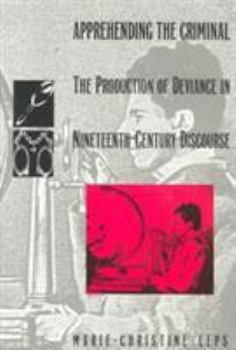Apprehending the Criminal: The Production of Deviance in Nineteenth Century Discourse
Select Format
Select Condition 
Book Overview
In this wide-ranging analysis, Marie-Christine Leps traces the production and circulation of knowledge about the criminal in nineteenth-century discourse, and shows how the delineation of deviance served to construct cultural norms. She demonstrates how the apprehension of crime and criminals was an important factor in the establishment of such key institutions as national systems of education, a cheap daily press, and various welfare measures designed...
Format:Paperback
Language:English
ISBN:0822312719
ISBN13:9780822312710
Release Date:August 1992
Publisher:Duke University Press
Length:288 Pages
Weight:1.70 lbs.
Dimensions:0.8" x 6.0" x 9.2"
Customer Reviews
0 rating





